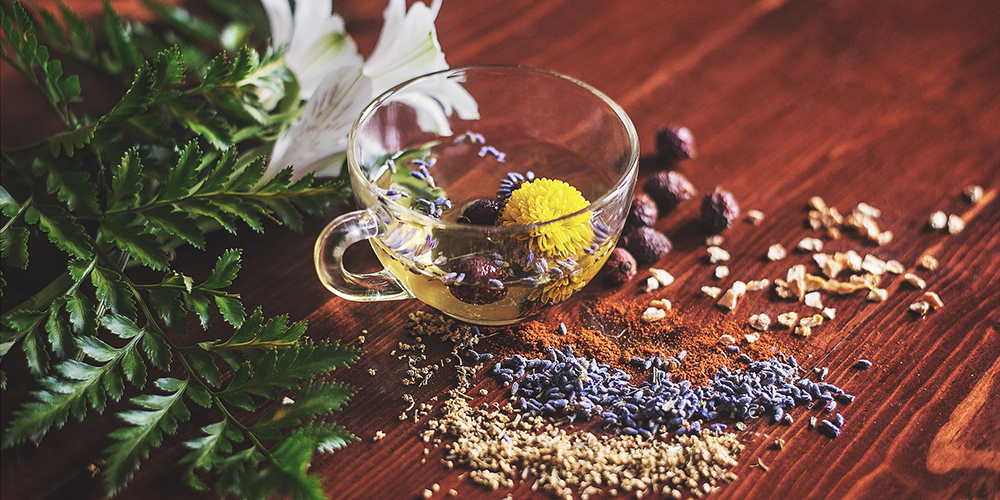You should always consult your physician for personalized medical advice. Never disregard or delay seeking professional medical advice or treatment solely because of something you read online.
Tea is not a medicine and should not replace medical treatments issued by your doctor. That being said, we found compelling evidence certain herbs found in our herbal teas have major health benefits for fighting illness and for maintaining health.
1. Holy Basil (Tulsi)
Holy Basil, also known as Tulsi, may boost your immune system. In a four week study on 24 healthy volunteers, people who took Tulsi extract had a significant increase in helper T cells and natural killer cells that defend the body from viral infection. The researchers concluded, “These observations clearly ascertain the immunomodulatory role of Tulsi leaves extract on healthy volunteers.”
Recommended: Tulsi Chai Tea – This chai blend offers the spice and complexity of a traditional chai accented by tulsi. It’s great for lattes.
2. Fennel
Fennel has “displayed strong antiviral effects against HSV-1” in a test-tube study against the herpes virus and parainfluenza type-3 (PI-3), which causes respiratory infections in cattle.
Recommended: Our Emperor’s Legend Turmeric Chai Herbal Tea blends fennel with multiple powerhouse herbs like anise, cloves, cardamom, and ginger for a healthful and flavorful cuppa.
3. Lemon Balm
Studies have shown lemon balm extract may fight viruses, including influenza and herpes. “In conclusion, lemon balm essential oil ingredient seems to act as [a] natural and novel antiviral substance through the different stages of influenza virus (H9N2) replication.”
Recommended: Our hand-blended Calming Harmony Herbal Tea features the light citrus taste of lemon balm and lemongrass for a flavor reminiscent of a lemon creamsicle.
4. Peppermint
Peppermint leaf extract has exhibited “…significant antimicrobial and antiviral activities, strong antioxidant and antitumor actions, and some antiallergenic potential…” in test tube studies. It also has anti-inflammatory and antioxidant effects.
Recommended: Pure Peppermint Herbal Tea has long been thought to calm the stomach and provide stress relief.
5. Echinacea
Nearly every part of the echinacea plant has been used throughout history for its natural remedy properties, including its flowers, leaves, and roots. Recent studies have demonstrated Echinacea has virus-fighting capabilities. “Thus all strains of human and avian influenza viruses tested (including a Tamiflu-resistant strain), as well as herpes simplex virus, respiratory syncytial virus, and rhinoviruses, were very sensitive to a standardized Echinacea purpurea preparation.”
Recommended: We blend echinacea with the robust flavors of elderberry and ginger and the mellowing sweetness of licorice root in our proprietary Healthy Harmony Herbal Tea blend.
6. Sambucus (Elderberries)
Elderberries are in the sambucus family of plants, and are often incorporated into natural antiviral treatments for the cold and flu. Studies have shown concentrated elderberry juice suppressed influenza virus replication and stimulated the immune system response of mice. Elderberry supplements were also found to substantially reduce upper respiratory symptoms caused by viral infections in an analysis of 180 people.
Recommended: Our Organic Bright Berry Tisane is packed with tasty treats high in vitamin C, including elderberries, raisins, and hibiscus.
7. Licorice
Licorice contains powerful antiviral and antimicrobial substances, and has been used in traditional Chinese medicine for centuries. Recent studies have shown the 20 triterpenoids and nearly 300 flavonoids found in licorice “possess many pharmacological activities, such as antiviral, antimicrobial, anti-inflammatory, antitumor and other activities.”
Recommended: We blend licorice with rooibos, lemongrass, and a splash of hibiscus make Organic Pink Lemonade Herbal Tea, a smooth, sweet and tart infusion.
8. Ginger
Studies found ginger has antiviral activity against avian influenza virus H9N2 and Feline Calicivirus, a surrogate for Human Norovirus. Ginger also contains volatile oils that have analgesic, sedative, anitpyretic, and antibacterial properties. A paper on preventive management of H1N1 Flu (Swine Flu) pandemic states, “Anti-influenza agents have been isolated from Z. officinale [ginger]”.
Recommended: A smooth black tea gives a strong base for real dried peaches and bits of ginger in our Ginger Peach Black Tea, which is also great iced!
9. Ginseng
Ginseng has a number of immuno-modulatory effects, including a resistance to respiratory syncytial virus infection, Herpes simplex virus, and an immunity boost against viral infections in general. “In addition to anticancer, anti-inflammatory, and immune-modulatory activities, KRG [Korean Red Ginseng] and its purified components have also been shown to possess protective effects against microbial infections.”
Recommended: This Ginseng Oolong Tea is crafted with Ti Kuan Yin and ginger for a special flavor.
10. Dandelion
The dandelion has long been used in traditional Chinese anti-flu remedies for good reason. One study found dandelion extracts “possess anti-influenza virus properties.” Others have focused on specific viruses and found dandelion extract had strong activity against HIV-1 and hepatitis B.
Recommended: Our Restoring Harmony Herbal Tea balances a subtle note of peppermint with floral tones of calendula and lavender over the vegetal quality of dandelion and nettles.
While more research needs to be done, incorporating herbal teas into your healthy lifestyle may provide some serious health benefits.
As always, we’re happy to answer any questions you may have at listening@theteasmith.com.



Charlie
8 Apr 2020Thank you for the information!